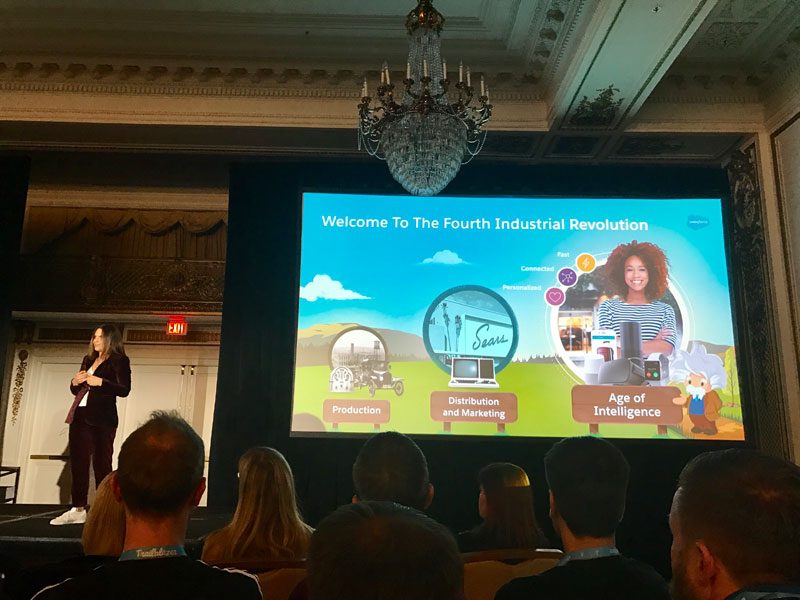“Personalized, connected and fast” have been the recurring themes from Dreamforce 2017, as retailers seek to gain a competitive edge in a quickly evolving industry. Consumers no longer walk into stores uninformed; they are empowered, and distressingly, only 4% think the brand knows them, according to Salesforce.
“This is complicated; most of our customers are sitting on top of legacy systems that are a circulatory center of any retail operation, but they’re not helping to connect retail with customers,” said Shelley Bransten, SVP of Retail for Salesforce during the retail keynote at Dreamforce, being held November 6-9 in San Francisco. “We have to bridge the gap with intelligence — it’s about making sure things are personalized, connected and fast.”
Personalization is critical in today’s retail environment, and customers demand it. Research from the Salesforce Connected Shopper Report revealed that 79% of consumers want a personalized offer delivered to them, and 67% want to share their data to get faster service in the store.
During the keynote, Bransten highlighted a use case from Adidas, which is making moves to provide more personalized and informed experiences to customers. Retail TouchPoints also spoke with Dwight Moore, Senior Director of Product Marketing, Retail at Salesforce, to get a closer look at the trends the company is seeing in retail and how retailers like Party City and Suit Supply are tackling them.
Adidas Launches Personalized Shopping App
This week, Adidas launched a new shopping app through Salesforce in response to its research around consumer needs. The app will act as a “hub” for digital interaction with the brand and features a personalized newsfeed, a chatbot and a complete online store. The personalized features are provided based on the user’s shopping history and additions to their profile, such as birthday and gender.
As for the chatbot component of the app, the interaction will first be one-on-one with a human. However, Adidas is looking to leverage artificial intelligence to handle easy inquiries, such as “What colors or sizes do the sneakers come in?” The bot will hand over the conversation to a human when questions become too complex.
Adidas is using a digital approach to create direct connections with consumers and support their journeys. The brand has created a premium experience that inspires love for the brand and desire for the product, connected it by creating a seamless experience across touch points, and personalized it to give consumers what’s interesting for them and what they need in the context of that moment.
“[Many retailers often say] ‘yes, yes, we design for the consumer,’ but how do you actually, fundamentally, put the consumer at the center of how you’re organized as a company so that the capabilities you design are based on their needs?” said Joseph Godsey, head of Digital Commerce at Adidas during the keynote. “We spent a lot of time understanding what the consumer needs were so we can design the experience around them.”
Three Hot Retail Trends From Dreamforce 2017
The biggest challenge retailers are facing today, according to Salesforce’s Moore, is getting the right information to the right audience in a personalized manner, where they can then take action based on that information. This strategy needs to work for both stakeholder groups: shoppers and employees.
“For a shopper, it’s presenting them with a relevant offer to entice them to learn more and go online or to the store,” said Moore. “For the employee, it’s about giving them the right insight, so when the shopper comes in the door, they have the right product knowledge about what they’re selling and they can serve the shopper intelligently. In a lot of cases, having insight to where the shopper is, their browsing behavior or prior purchase behavior helps to serve them in a more relevant way in-store.”
Moore highlighted three key priorities that will benefit from new technology implementations:
- Employee enablement and empowerment;
- Customer service; and
- Data management platforms (DMP).
Party City Mobile Devices Give Employees Inventory Insights
A key trend revolves around employee enablement and empowerment because employees often are not as well educated as they could be about a retailer’s products. A majority of retail employees today are Millennials or Gen Zers — both digital natives who are attached to their mobile devices. “There’s an expectation when [Millennials and Gen Zers] go to the workforce, they want to use their mobile device,” said Moore. “What we see now is retailers empowering their associates with mobile devices.”
For example, since the price of employee mobile devices has decreased, Party City has added more devices in stores, up to four from one previously, according to Moore. In part, the devices are giving employees better insight into inventory location and shelf availability. Party City uses an app to help employees keep shelves stocked more effectively.
“It starts with enabling employees to collaborate with one another in the store and across the stores, and to send that insight of what’s happening up to [departments] where merchandising decisions are being made,” said Moore.
Service Is The New Marketing
Moore described service as “the new marketing.” Savvy brands are now using the service center to learn more about their shoppers and engage them intelligently. This includes driving transactions and turning inquiries into sales, learning about the shoppers’ likes, dislikes and preferences, and using that insight in marketing to personalize their experience. “We see chatbots enabling that,” said Moore.
Suit Supply uses its service reps — called agents — to capture these types of insights. The retailer leverages a dashboard that showcases the customer’s past purchases, lifetime value and more. Equipping the agents with this data gives Suit Supply an advantage when it comes to product recommendations.
“There’s data we know, data we can infer and data we can buy,” said Moore. “And then there’s data that we’re only going to know if we ask the shopper. So savvy retailers are looking for the pieces of information that, in the limited time they have, allows them to use it to learn more about the shopper and help personalize their experience the next time.”
DMPs Combat The Amazon Effect
Adidas, along with other Salesforce customers, is using the Krux DMP, which Salesforce acquired in 2016, to power its app. DMP is designed to intercept the shopper “before they even have to think about the product,” according to Moore, who also said the platform is a hot trend among customers.
“It’s important for retail because 55% of product searches start on Amazon today,” said Moore. “So if I’m a shopper, I know a product I’m looking for, and a majority of the time, I’m going to go to Amazon where they have product selection, different opportunities around how quickly I want something, and different prices. DMP is about highly targeted, digitally relevant ads that are presented to that shopper, whether it’s online, on mobile devices or a social site. DMP inspires retailers to take action to drive awareness, so now I’m going to go on that retailer’s web site or their store instead of searching for it on Amazon.”













